
Medical Care
-
Vaccinations
In order to maintain your dog’s health and protect him from infectious disease, it’s important to keep him current on his vaccinations. Fetch vaccinates all dogs and puppies over 6 weeks upon arrival and on-schedule until they are adopted. This means that adopters of young puppies will often need to finish up their new puppy’s schedule of booster shots after adoption. We provide a vaccination history for adopters so that they are able to continue the schedule. Fetch vaccinates dogs that enter our care with the following vaccines:
DA2PP: Protects against Distemper, Adenovirus-2, Parainfluenza, Parvovirus
Bordatella (dogs over 16 weeks): Protects against Kennel Cough
Rabies: (dogs over 16 weeks): Protects against Rabies virus. Wisconsin State Law requires that all Dogs be vaccinated for Rabies by the age of 5 months. Rabies Vaccinations are good for 6 months, 1 year or 3 years depending on the type of vaccine used and the age of the animal when the vaccination was given. Owners should check with their vet and make sure their pets are up to date on rabies vaccinations at all times.
-
Preventatives
Flea/tick: Keep your dog on monthly topical flea prevention! Besides being an irritant for your dog, flea bites can cause hot spots and irritation. Some dogs have allergic reactions to fleas, which can cause hair loss and red, irritated skin. Fleas can also transmit other diseases such as tapeworms. Be sure to thoroughly read the instructions for the topical flea treatment you use and talk to you bet about what to do in the winter months.
Heartworm: Talk to your veterinarian about heartworm prevention – your vet will be able to make recommendations based on the risk to your individual dog.
Ticks, Foxtails and Burrs: If your dog has a longer coat he is more likely to collect ticks, foxtails and burrs, but any dog can pick them up. Check your dog frequently, especially after walks and hikes in woodsy areas. Ticks can transmit disease, burrs irritate the skin, and foxtails can travel through your dog’s skin and lodge themselves inside your pet. Make sure to check sensitive areas such as the paws, nose, ears, and around the eyes especially.
-
Grooming
It is important to maintain appropriate grooming! Different dogs have different grooming needs. Dogs and puppies with short coats need less grooming but more skin care, while dogs with long fur need frequent brushing (2-4 times per week) to prevent mats and tangles. Dogs with hair instead of fur (such as Yorkies, Poodles and Schnauzers) require regular trips to professional groomers. Grooming also includes trimming your dog’s nails every couple of weeks, cleaning ears regularly, and brushing teeth several times per week.
-
Regular Veterinary Exams
Your dog should visit a veterinarian once a year for a routine exam and yearly vaccinations. Senior dogs may need to go to the vet more often to have additional procedures, such as regular dental cleanings or blood work.Description goes here
-
Monitoring
In addition to monitoring your dog for coughing, sneezing, vomiting, diarrhea, loss of appetite, limping and areas of skin irritation or growth, we recommend paying close attention to signs that may be less obvious. Weight loss or gain, increased appetite, drinking or urination, reluctance to jump or be active, bad breath or drooling and thinning of hair or coat can all be signs of illness or injury. Please take your dog to a veterinarian if you notice these signs. It is much easier to treat illness early before it has progressed.
Spay and Neuter Information
If your pup is not quite old enough to be spayed/neutered prior to adoption, a spay/neuter deposit of $200 (in addition to the adoption fee) is required at the time of adoption. This provides incentive for the you, the adopter, to complete the procedure when your dog is between the ages of 6 - 18 months.
There are two options for post-adoption spays/neuters:
Schedule at Precision Veterinary Clinic in Madison, WI, and bill directly to Fetch
Fetch has already negotiated post-adoption spays and neuters at Precision Veterinary in Madison, Wisconsin. You can contact Precision (info@precisionveterinary.com) to schedule an appointment, letting them know you are bringing in an adopted Fetch dog. They will bill Fetch directly for your spay/neuter.
Use your own vet
Should you decide to spay/neuter with your own veterinarian, this will be at your own expense, but you will still get your deposit back.
Toxic Foods and Household Items
Foods
Alcoholic beverages, avocado, chocolate (all forms), coffee (all forms), garlic, grapes, macadamia nuts, moldy or spoiled foods, onions, onion powder, raisins, salt, Xylitol (sweetener), yeast dough.
Medications (generic types): Anti-cancer drugs, antidepressants, cold medications, diet pills, painkillers, vitamins.
Seasonal Hazards
Warm weather hazards: Animal toxins, blue-green algae in ponds, citronella candles, cocoa mulch, compost piles, fertilizers, flea products, fly baits containing methomyl, slug and snail baits containing metaldehyde, swimming pool treatment supplies.
Cold weather hazards: Antifreeze, ice-melting products, liquid potpourri, rodent bait. Holiday Hazards Christmas tree water (may contain fertilizers and bacteria), batteries, electrical cords, glass ornaments, ribbons or tinsel (can become lodged in the intestine and cause obstruction – most often occurs with kittens).
Poisons Plants: please check the plants around your house and yard as many are toxic to dogs.

